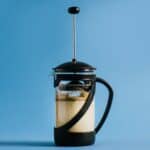If Your French Press Coffee Tastes Bitter, Do This!

French press coffee is a popular brewing method known for its rich and full-bodied flavour. However, sometimes the coffee can turn out bitter, leaving a less-than-pleasant taste. Understanding the common reasons for bitter French press coffee and how to fix them can help you enjoy a delicious cup every time. Let’s explore the key takeaways from each section of this article:
Key Takeaways
- Using the correct coffee grind size is crucial for a balanced extraction and flavour profile.
- Avoid over-extracting coffee by controlling the brewing time and ensuring proper water-to-coffee ratio.
- Quality water is essential for brewing great coffee; use filtered water and maintain the right temperature.
- Choose fresh, high-quality coffee beans and store them properly to preserve their flavour.
- Experiment with brewing techniques like stirring, adjusting brewing time, and trying different grind sizes to enhance the taste of your French press coffee.
Common Reasons for Bitter French Press Coffee
Using Incorrect Coffee Grind Size

The grind size of your coffee beans is crucial for a perfect French Press brew. Using a grind that is too fine can lead to over-extraction, resulting in a bitter taste. Conversely, a grind that is too coarse may under-extract, producing a weak and underwhelming cup. Here’s a quick guide to help you identify the right grind size:
- Fine grind: Suitable for espresso, but too fine for French Press.
- Medium grind: Often recommended for drip coffee makers.
- Coarse grind: Ideal for French Press and cold brew.
Remember, the goal is to achieve a balance where the water can extract the coffee flavours efficiently without pulling out the bitter compounds. A coarse grind size is used for cold brew because it takes longer to extract flavour from the grounds, and a less fine grind won’t clog up your filter as easily. This principle applies to French Press as well; a coarse grind ensures a smooth extraction process.
Adjusting the grind size can be a simple yet effective way to improve your French Press coffee. Experiment until you find the sweet spot that yields a rich and full-bodied brew without the bitterness. For more information on this topic, check out my post on the Perfect French Press Grind Size here.
Over-Extraction of Coffee
Over-extraction occurs when coffee grounds are in contact with water for too long, leading to a release of undesirable bitter compounds. The key to preventing over-extraction is to control the brewing time meticulously.
To avoid over-extraction, consider the following steps:
- Use a timer to ensure consistent brewing time.
- Stop the brewing process by pressing the plunger down at the right moment.
- Immediately pour the coffee after pressing to prevent further extraction.
By adhering to a precise brewing schedule, you can enhance the flavour profile of your French press coffee and eliminate bitterness.
Immersion coffee brewing requires a relatively long brew time compared with other ways of making coffee, such as filter or espresso.
Not Using the Proper French Press Technique
Achieving the perfect cup of French Press coffee requires attention to the way you steep, plunge and pour your coffee. Everyone has their own interpretation of how to best use a French press, but I would personally recommend adhering to a slightly modified version of James Hoffmann’s French Press method.
After adding hot water to the grounds, wait for 30 seconds to let them bloom before starting your timer.
- Once the timer starts, allow the coffee to steep undisturbed.
- Then, after around 5 minutes, gently remove some of the built up crust from the surface of your French press.
- Leave for another 5-7 minutes and don’t disturb the coffee.
- After 10-12 minutes, begin to press down on the plunger with consistent pressure, stopping about half way down. This will allow the sediment at the bottom of the French press to remain settled, limiting the amount of sediment that ends up in your cup.
- Remember, the key to a consistent brew is not just the total time, but also maintaining the same process each time you make coffee. This includes the rate at which you press the plunger down.
Quality of Water Matters
Using Hard Water
The type of water you use in your French Press can greatly affect the taste of your coffee. Hard water, which is high in minerals like calcium and magnesium, can make your coffee taste bitter. These minerals can also build up in your coffee maker, affecting its performance over time.
To mitigate the effects of hard water, I would recommend using filtered or bottled water. If you’re unsure about the hardness of your tap water, you can purchase a water testing kit or check with your local water utility. Here’s a simple guide to help you understand water hardness levels:
| Water Hardness | Description |
| 0-60 mg/L | Soft Water |
| 61-120 mg/L | Moderately Hard |
| 121-180 mg/L | Hard Water |
| Over 180 mg/L | Very Hard Water |
Remember, the goal is to find a balance that extracts the best flavour from your coffee beans without introducing unwanted bitterness. Therefore, the most consistent you can keep your water, the better your French press results will be.
If you’re a frequent French Press user, it’s worth investing in a good water filter or considering other water sources. This small change can make a significant difference in the quality of your coffee.
Water Temperature Too High
The temperature of the water used to brew French Press coffee is critical to avoid a bitter taste. Water that is too hot can cause over-extraction, leading to bitterness. The ideal temperature range for brewing is between 195°F to 205°F (90°C to 96°C). Exceeding this range can negatively impact the flavour profile of your coffee.
It’s important to let boiling water cool for about 30 seconds to a minute before pouring it over the coffee grounds. This simple step can make a significant difference in the taste of your brew.
Here’s a quick guide to the recommended water temperatures for different coffee methods:
- French Press: 195°F – 205°F (90°C – 96°C)
- Pour-over: Below 205°F (96°C)
- Espresso: Around 200°F (93°C)
Remember, using water that is too hot is a common mistake but easily rectified with a little patience and attention to detail.
Water-to-Coffee Ratio Incorrect
Getting the water-to-coffee ratio just right is crucial for a balanced brew. An incorrect ratio can lead to a bitter or weak cup of French Press coffee. For a standard cup, a common recommendation is a 1:15 ratio of coffee to water. However, personal taste preferences play a significant role, and experimenting with ratios can lead to your perfect cup.
- Start with a 1:15 coffee-to-water ratio as a baseline.
- Adjust the ratio incrementally to suit your taste.
- Use a scale for precise measurements.
Remember, consistency is key. Once you find your ideal ratio, stick to it for a consistent flavour profile.
It’s also helpful to use a calculator or chart to ensure you’re using the right amounts. Here’s a simple guide:
| Coffee (grams) | Water (ml) |
| 15 | 225 |
| 30 | 450 |
| 45 | 675 |
Fine-tuning the ratio can significantly enhance your French Press experience, moving you away from the bitterness towards a more enjoyable cup.
Impact of Coffee Beans on Taste
Stale Coffee Beans
The freshness of your coffee beans is crucial to achieving a delicious cup of French Press coffee. Stale beans result in a flat and unappealing taste, often contributing to bitterness. Freshly roasted beans contain oils and aromatic compounds that are essential for a full-bodied and flavourful brew.
- Purchase beans in small batches to ensure they’re used while fresh.
- Check the roast date before buying; beans are best used within a month of roasting.
- Grind beans just before brewing to preserve flavour and aroma.
- Buy freshly roasted coffee beans from an independent coffee shop, roastery or through an online subscription.
Remember, the degassing process, where beans release carbon dioxide, affects flavour. Beans that have degassed or exposed to the elements too long lose their complexity and can contribute to an undesirable taste in your coffee.
Low-Quality Coffee Beans
The quality of coffee beans is paramount to the final taste of your French Press coffee. Low-quality beans can introduce unwanted bitterness and lack the nuanced flavours that high-quality beans offer. Often, these beans are sourced from less ideal growing conditions or are processed using methods that don’t preserve the bean’s natural characteristics.
- Washed coffees tend to have a more acidic bite, reminiscent of citrus fruits, which can be mistaken for bitterness if the beans are of low quality.
- Darker roast profiles, while they can mask some imperfections, might also overpower the bean’s natural flavours, leading to a flat and bitter taste.
- Certain coffee types, like Robusta or Excelsa, are often unfairly labelled as low quality due to poor growing and processing practices rather than the bean’s inherent qualities.
To ensure a rich and balanced flavour in your French Press coffee, it’s crucial to select high-quality beans that have been properly processed and roasted. This will help avoid the bitterness often associated with inferior beans.
Improper Coffee Bean Storage
Improper storage of coffee beans is a common mistake that can lead to a disappointing cup of French Press coffee. Storing beans incorrectly can cause them to go stale, losing their rich flavour and aroma. To maintain the freshness of your coffee beans, consider the following tips:
- Store beans in an airtight container to protect them from air and moisture.
- Keep the container in a cool, dry location away from direct sunlight.
- Avoid storing beans in the refrigerator or freezer as temperature fluctuations can cause condensation.
By adhering to proper storage techniques, you can extend the life of your coffee beans and ensure a more flavourful brew.
Remember, coffee beans can go bad and their taste can diminish over time. It’s best to purchase beans in smaller quantities that you can use within a few weeks to a month.
French Press Brewing Techniques to Reduce Bitterness
Stirring the Coffee Grounds
Stirring the coffee grounds during the brewing process can significantly affect the taste of your French Press coffee.
Proper agitation ensures even extraction, which is crucial for a balanced flavour profile. Without stirring, some grounds may over-extract while others under-extract, leading to a brew that is both bitter and weak.
Remember, the goal is to achieve a uniform extraction, so a gentle stir at the start of the brew is sufficient. Vigorous stirring can lead to over-extraction and a bitter taste.
Adjusting Brewing Time
The key to a smooth and flavourful cup of French Press coffee often lies in finding the perfect brewing time. Adjusting the brewing time can significantly alter the taste of your coffee, making it stronger or milder according to your preference. It’s a delicate balance; too short and the coffee will be weak, too long and it may become bitter.
- For a weaker cup, aim for a brewing time of 2-3 minutes.
- A standard brew typically requires 4 minutes.
- For a stronger taste without added bitterness, consider double-brewing with a medium roast.
- Personally, I would recommend letting your French press coffee brew for around 10-12 minutes to ensure you get as much coffee flavour extracted from those coarse grounds as possible.
Remember, the coffee continues to be extracted even after the plunger is pressed, so it’s crucial to serve it immediately to prevent over-extraction. Experiment with the timing to find what works best for your taste buds.
Experimenting with Different Grind Sizes
The grind size of your coffee beans can significantly affect the taste of your French Press coffee. Experimenting with different grind sizes can lead to discovering the perfect balance for your palate. A finer grind may result in a more robust flavour, but it can also cause over-extraction and bitterness if not monitored carefully.
- Coarse grind: Best for a lighter, smoother cup
- Medium grind: Offers a balance of flavour and body
With the French press, I would advise starting with a coarse grind and gradually dialling in finer grind settings until you reach a point of bitterness and astringency (a dry feeling at the back of the mouth).
It’s also worth noting that different coffee beans may respond differently to grind sizes. What works for one type of bean may not work for another, so be open to adjusting your approach based on the coffee you’re using. You’ll want to grind a dark roast slightly coarser than a lighter roast, as they tend to be more porous, whereas lighter roasted coffee is more brittle.
Summary
Overall, addressing the reasons for bitter French press coffee is essential to enjoy a flavourful and satisfying brew. By understanding the common issues such as over-extraction, improper grind size, and water temperature, coffee enthusiasts like you can take the necessary steps to fix them.
Implementing these solutions, can greatly improve the quality of French press coffee, leaving you more satisfied in the morning. I hope you found this article useful, comment down below if you have any additional French press fixes in mind!
Bitter French Press Frequently Asked Questions
Bitter French press coffee can result from using incorrect coffee grind size, over-extracting the coffee, or inconsistent brewing time.
To fix bitter French press coffee, consider adjusting the coffee grind size, brewing time, and water-to-coffee ratio. Experiment with different variables to find the right balance.
Yes, the quality of water matters. Using hard water or water with a high temperature can contribute to bitterness in French press coffee. Ensure you use filtered water at the right temperature.
Stale coffee beans can indeed result in bitter French press coffee. Always use fresh, high-quality coffee beans for the best flavour.
Proper storage of coffee beans is crucial for maintaining their freshness and flavour. Store coffee beans in an airtight container in a cool, dark place.
Stirring the coffee grounds in a French press can help ensure even extraction and a balanced flavour profile. Experiment with stirring techniques to find what works best for you.



